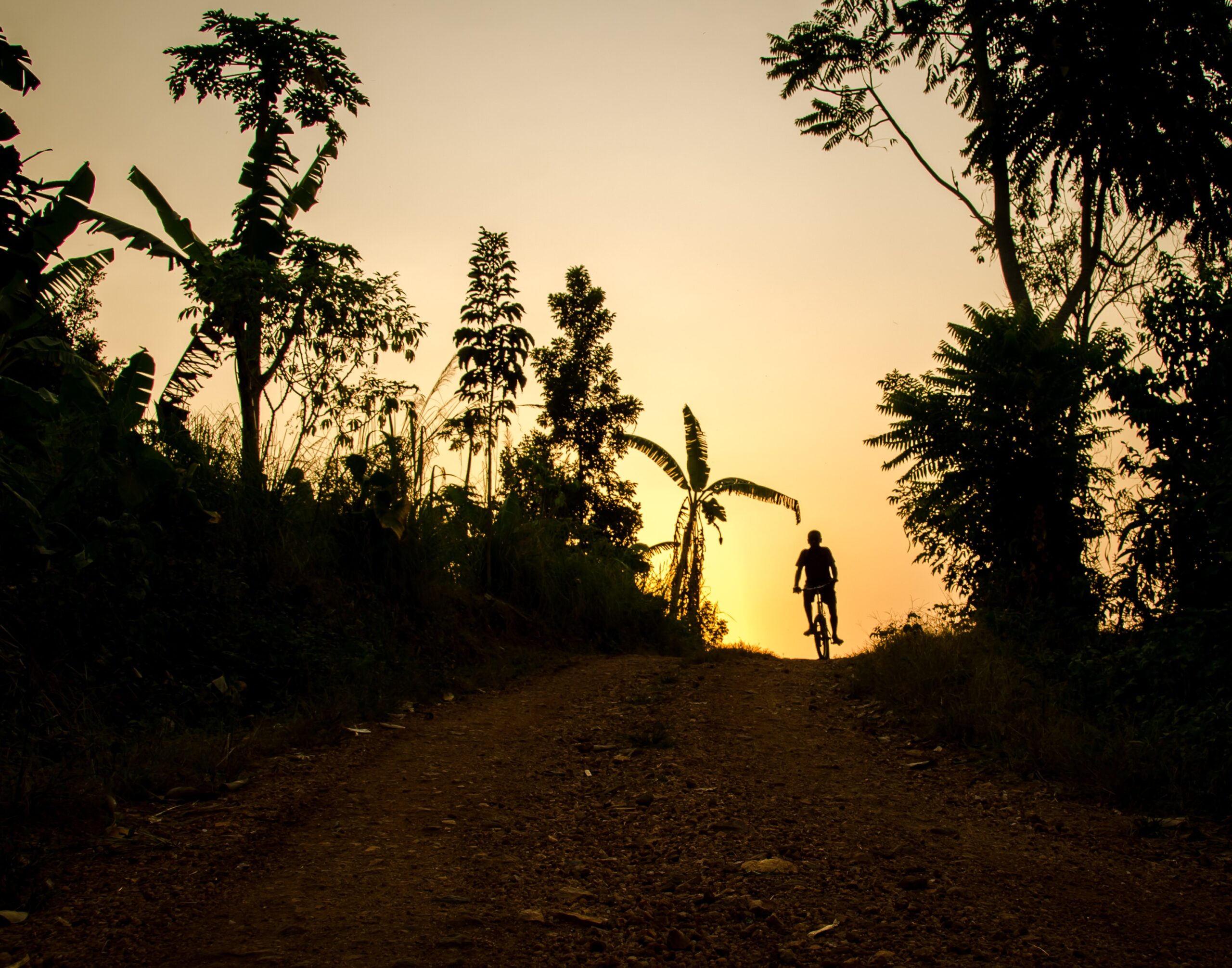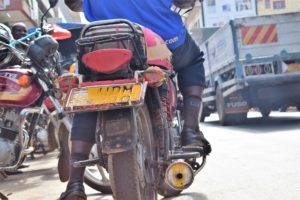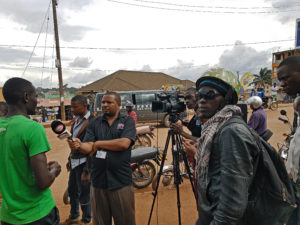Using digital stories for inclusive climate resilient transport in Uganda

This case study is part of the SEI Urban Toolbox for Liveable Cities which has been developed by the SEI Initiative on City Health and Wellbeing. The Urban Toolbox is a collection of tools, developed within SEI or in coordination with SEI, aimed at supporting planning and decision-making for improving the health, well-being and resilience of city residents and urban systems more broadly.
This case study demonstrates how Digital Storytelling can be used to share information.
Summary
Digital storytelling was used to help explore the impact of a Boda Boda Free Zone on the mobility of disadvantaged groups and vehicle emissions in Kampala, Uganda.
The Inclusive Climate Resilient Transport Planning in Africa project was funded as part of the UK Foreign, Commonwealth and Development Office (FCDO)’s High Volume Transport (HVT) Applied Research Programme (2020–2022) and was managed DT Global UK.
The research was undertaken by SEI in collaboration with the United Nations Environment Programme’s (UNEP) Share the Road Programme, and local consultants in Uganda.
Introduction
The case study in Kampala assessed the impact of implementing a “Boda Boda Free Zone” on disadvantaged groups, by using creative methods to engage riders and passengers. It also sought to understand how climate change and air pollution affects the journeys people take.
The case study aimed to strengthen the technical capacity to support the formulation and implementation of more inclusive climate resilient low carbon mobility in the city through close collaboration with the Kampala Capital City Authority.
Boda Bodas (motorcycle taxis) are a common means of public transport used in Uganda and especially in the capital city of Kampala. They are a source of livelihood for young people, convenient and cheap for users, and avoid traffic congestion. Unlike other public transport services, Boda Bodas provide accessibility to nearly all areas of the city. There are currently an estimated 120,000 Boda Bodas operating in Kampala City. Their name originates from the “border-to-border” rides between Uganda and Kenya in the 1960s and 70s.
The Boda Boda Free Zone, was proposed by the Ugandan government during the COVID pandemic first and foremost as a safety and public space quality improvement measure. Other measures to regulate Boda Boda riders included their registration at stages (pick-up points) and through the use of apps e.g. SafeBoda.

banzaye/pixabay” />
Boda Bodas pose a threat to the health of non-motorized transport users, as they are a source of air pollution and exacerbate road safety problems in Kampala’s mixed traffic. While the ban on them may have benefits for road safety, public space, climate and air quality, conversely, it could also have negative impacts on the livelihoods of youths, as well as reducing mobility options of poorer citizens who rely on Boda Bodas. It may also result in concentrating the Boda Bodas elsewhere, at unofficial stages; therefore, simply shifting the issue.
Methods and Tools
Study Area
Based on a decision by the Cabinet of Uganda, on 25th July 2020, a proposal was made to restrict access by Boda Bodas to Central Business District of Kampala.
Methodology
Various data collection methods were used in the study to gain different perspectives of the mobility challenges faced by road users (service providers and disadvantaged groups) following the establishment of the Boda Boda Free Zone. These include: digital storytelling, on-street interviews, field observations, participatory mapping, scenario and visioning (Delphi approach) .
Digital storytelling
Digital storytelling was used in Kampala, Uganda to explore the impact of implementing the Central Business District Boda Boda Free Zone on the mobility of disadvantaged groups.
Using collaborative processes, participants and facilitators worked together to produce powerful stories about mobility challenges facing vulnerable road users. Digital media (photo, video, audio) was used to document, highlight and explain the lived experience of different road users, providing insights into issues that would have otherwise been inaccessible using traditional interview methods.
Representatives from disadvantaged and vulnerable groups produced short digital stories highlighting the routes they usually took, describing the personal difficulties they experience on a daily basis. They were also able to propose solutions to their mobility challenges as well, through their stories.
The process for creating the stories involved the following steps:
- Recruitment of volunteers including a pregnant mother, a person with physical disability, a pedestrian, a bicycle rider and a young person representative. The purpose of the activity was explained to participants and informed consent obtained for best ethical practice.
- The participants and the project team/facilitators worked together to identify and develop the narratives for their stories. The participants described transects along the usual routes they took, then identified and talked about locations where vulnerable individuals, such as themselves, face personal mobility challenges.
- Individual experience was captured through videos and photos using a digital camera operated by a professional photographer. The decision for this was based on safety concerns for the individuals riding on the back of the Boda Boda.
- Commentary to the video, captions and audio were added by the project team (due to COVID-19 restrictions). Computer software was used to organise, edit, arrange, and produce a coherent narrative to the issues. Feedback was provided from the participants to ensure the stories were representative of their viewpoints.

In addition, cameras were used to observe the traffic situation in Kampala from the perspective of the Boda Boda riders themselves. Selected riders had cameras mounted on their motorcycle to record their journey over a set route.
In conclusion, these mobility narratives provided insights into lived experiences and issues that would have otherwise been inaccessible to transport planners or urban decision makers.
Other methods used:
Stakeholder interviews Different stakeholders were consulted about their opinions on mobility issues in Kampala; the impact of the Boda Boda Free Zone; and how climate affects their Boda Boda usage. Stakeholders included: motorcyclists, passengers, planners, decision makers, civil society organizations, and disadvantaged group representatives.
Participatory mapping Mapping was used to record the locations of Boda Boda motorcycle stages used by passengers and to identify the principal routes they take. This helped identify the busiest areas of the Central business District (CBD). The map is also used as a tool to capture how people visualize the CBD without the motorcycle taxis.
Deliberative approaches
This is an approach to decision-making that allows participants to consider relevant information from multiple points of view. The case study utilized the Delphi method approach, developed by Rand, where a pool of experts considered a number of statements about the extent to which transport infrastructure is affected by climate change. Over a series of iterations, a facilitator compiled the responses, refined the statements and returned them back to the experts until a final consensus was reached.
Outcomes and Impacts
The videos were shared with the project participants and hosted on the HVT Programme website and social media channels. The process of developing digital stories in Uganda featured in a number of blogs and webinars.
Since the digital stories were made the implementation of the Boda Boda Free zone in Kampala was halted to engage more with key stakeholders. In addition, the sector has been further regulated, including the registration of Boda Boda drivers and greater use of fare apps such as SafeBoda for individuals to purchase tickets. Also, riders are being provided with training opportunities.
Related resources
- Inclusive climate-resilient transport in Africa
- Using creative participatory approaches for inclusive climate resilient transport in Africa: Guidelines for practitioners
- Storytelling for real: how voices of vulnerable road users can be heard
- Digital Storytelling Tool
- Assessing Inequalities in Wellbeing at a Neighbourhood Scale in Low-Middle-Income-Country Secondary Cities and Their Implication
- Using digital stories for inclusive climate resilient transport in Zambia
(0) Comments
There is no content